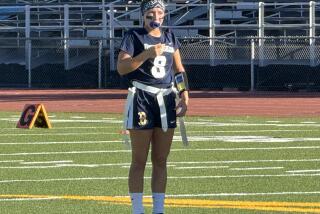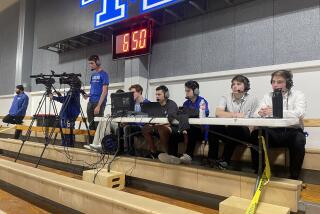Principal Adamant About Levying Fee for Student Bus Trips : Bell Gardens: She says athletes will not play next school year until they pay. The football coach says he will not help collect the controversial charge.
- Share via
SOUTHEAST AREA — The principal at Bell Gardens High has renewed her vow to crack down on athletes who do not pay a controversial transportation fee, after school officials collected only half of the money they expected this year.
Principal Maggie Rosette said athletes will not play next school year until they pay at least the first installment of a $60 charge for transportation to extracurricular events.
Her decision may lead to a confrontation with the school’s highly successful football coach, Dave Newell, who said he opposes the fee and will not help collect it. If officials try to impose the fee next fall, he said, “this may be my last year.”
“There’s no way you can force 150 football players from one of the poorest areas of Southern California to pay. That’s ludicrous,” said Newell, who has a 144-42-3 record. “They already have to pay $250 for things like football shoes and a student body card (to participate in school activities).”
The financially strapped Montebello Unified School District imposed the annual transportation fee last fall. It was to be paid by members of sports teams, bands and pep squads, among others.
At Schurr and Montebello high schools, coaches pitched in to help students find ways to pay the busing fee. They helped students get odd jobs or put together fund-raising efforts, such as selling candy, according to school athletic directors.
“A lot of our kids don’t have money either,” Schurr Athletic Director Ken Davis said. “We didn’t like this thing, but we felt we had to pay it.”
But in Bell Gardens, where more than a fourth of the residents are below the poverty line, the new fee triggered an uproar. The football team, which advanced to the championship game of the CIF Southern Section Division III last fall, threatened to forfeit its games rather than pay.
Rosette warned that students who did not ante up would not be allowed to participate in games, but then modified her position after city leaders complained.
Players were told they could pay the fee in installments of $20. Newell said many varsity football players paid the initial installment after some grumbling, but that most failed to pay the rest. Newell said he refused to collect the rest of the money.
School officials had expected to collect as much as $60,000. By the end of the school year, however, only half of that amount had been paid, said John McNichols, Bell Gardens activities director. Most athletes paid at least part of the fee, but only the girls and boys volleyball teams paid in full, he said. There are about two dozen students on those teams.
McNichols said Bell Gardens High administrators did not have enough time to work out a collection method because Rosette did not get word of the new fee until just before the start of the school year last September. The burden of collecting the fee fell to the coaches, and many refused.
As seniors walked down the aisle at graduation last week and teachers packed up their classroom belongings for the summer, administrators at Bell Gardens were still grappling with guidelines for collecting the fee.
Rosette said regulations for handling the fee should be ready by fall. She said she wants to form a committee of coaches and administrators to enforce fee collections.
She said returning students who did not pay the full amount this year will be asked to pay the remainder of the fee in the fall. Students who think they will have trouble paying the fee may be allowed to apply for a hardship waiver.
Students will be given the option of paying the charge in a lump sum before the season starts, or paying it in three parts. Those who do not pay will not be allowed to participate.
If a delinquent student has graduated, the school may refuse requests for grade transcripts until the fee is paid.
The school district discourages students who are participating in extracurricular activities from traveling to events on their own because of potential liability problems, according to Rosette.
Some districts, such as Downey Unified, have had transportation fees for extracurricular activities for years, while others are considering adding them as a way to generate more revenue.
In Bell Gardens, however, Rosette said she expects the fee to remain a controversial topic.
“Every time there is change when people have been used to others paying for services they receive, of course the new fee is going to be felt,” she said.
More to Read
Get our high school sports newsletter
Prep Rally is devoted to the SoCal high school sports experience, bringing you scores, stories and a behind-the-scenes look at what makes prep sports so popular.
You may occasionally receive promotional content from the Los Angeles Times.






